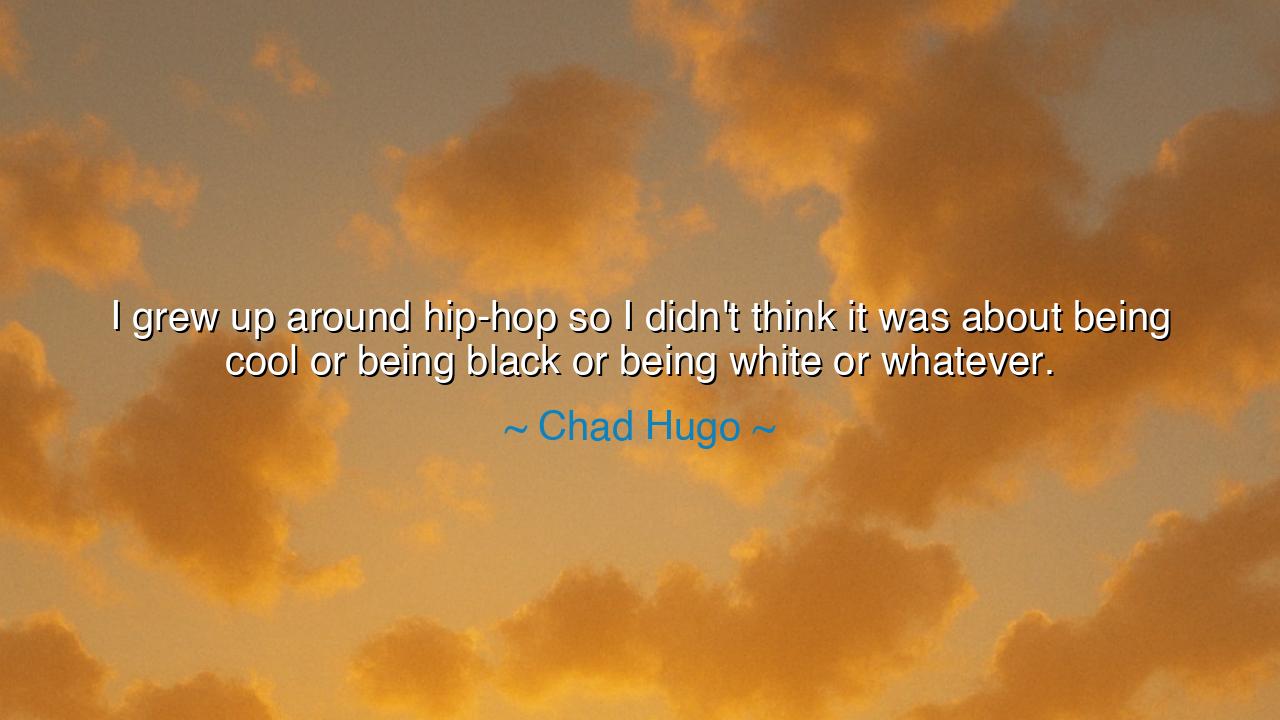
I grew up around hip-hop so I didn't think it was about being
I grew up around hip-hop so I didn't think it was about being cool or being black or being white or whatever.






In the vibrant world of music, there exists a truth that transcends the external markers of identity—whether it be race, status, or background. Chad Hugo, in his insightful reflection on his relationship with hip-hop, shares a profound understanding: "I grew up around hip-hop so I didn't think it was about being cool or being black or being white or whatever." This statement speaks to the heart of music’s true power—its ability to transcend the shackles of societal labels and connect people through the universal language of rhythm, expression, and emotion. For Hugo, the essence of hip-hop was never about fitting into a box but about the freedom to create and express oneself authentically, beyond the boundaries of race or societal expectations.
In the ancient world, the power of art and music was understood as something that spoke directly to the soul, unfiltered by the limitations of race, class, or origin. The great Greek philosophers, such as Plato, believed in the transformative power of music, seeing it as a means to unite individuals and cultivate virtue, regardless of their background. In the same spirit, hip-hop emerged not as a genre confined to a specific race or culture but as a powerful movement that resonated with anyone who experienced its raw truth and creativity. It was born in the streets but quickly spread across the globe, speaking to the human experience, and transcending the external labels that often divide us.
Consider the rise of Bach in his time. Though he was born into a humble family, his music eventually transcended any notion of class or social standing. Bach’s compositions, filled with emotion, complexity, and soul, are still revered today. People from all walks of life, across centuries, have found solace and inspiration in his music. Similarly, hip-hop, as Chad Hugo expresses, was never about being cool or adhering to societal expectations. It was about the pure expression of the self and the unfiltered reality of life—something that could resonate across different people, regardless of their background.
The power of hip-hop, like any form of art, lies in its ability to unite, to bring together diverse people with diverse experiences. Just as Leonardo da Vinci did not create his masterpieces to appeal to any particular class, but to express a deep understanding of human nature, hip-hop speaks to the universality of the human condition. It is not bound by race or class; it is an expression of life’s struggles, triumphs, and complexities. As Chad Hugo articulates, hip-hop was never about dividing people; it was about finding common ground through the rhythm of shared human experience. Whether in the streets of New York or the studios of Hollywood, hip-hop has always carried the potential to connect rather than separate.
Hugo’s reflection also touches on a deeper truth about identity. In a world constantly seeking to label and categorize individuals based on their external characteristics, true self-expression transcends these labels. The essence of art is not to be bound by the limitations of race, culture, or background, but to speak to the universal human soul. Whether it is hip-hop, painting, or writing, artists like Hugo understand that their work does not belong to a particular group but to the collective spirit of all people. In this way, hip-hop is both a personal and collective expression—a celebration of individual voice that also binds people together.
The lesson here is one of unity through individual expression. Chad Hugo’s words encourage us to see beyond the external labels that society often places on us—whether related to race, social class, or background. It is not these labels that define us, but the authenticity of our voice, our music, and our creations. Just as hip-hop speaks to all who feel its rhythm, our personal expression has the power to resonate beyond the confines of the world’s divisions. In our own lives, we must strive to embrace what makes us unique while recognizing that true connection comes from our shared humanity.
In your own journey, consider how you might express yourself authentically, without the constraints of the labels that society may place on you. How can you break free from the expectations of others and create, speak, or act from a place of true authenticity? Remember, true power lies not in fitting into a box, but in embracing what is unique within you. Whether through art, music, or daily actions, express yourself fully, knowing that your voice is part of a larger human story that transcends the labels the world seeks to place upon you.






AAdministratorAdministrator
Welcome, honored guests. Please leave a comment, we will respond soon